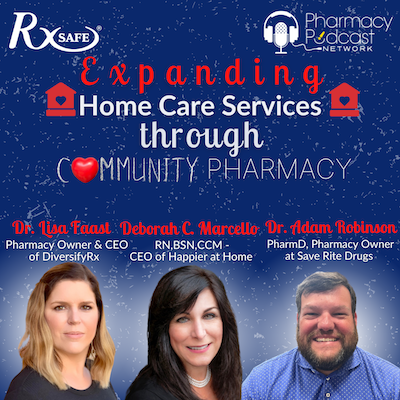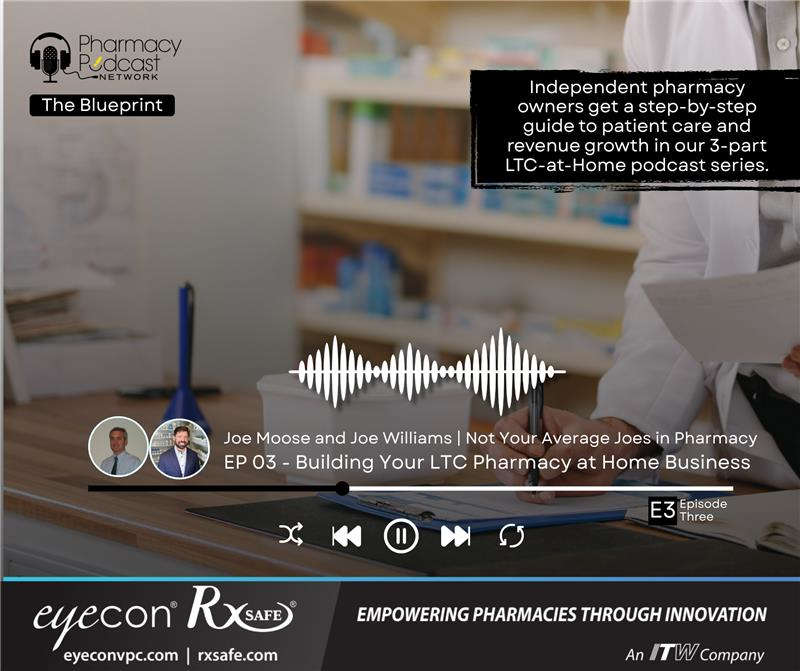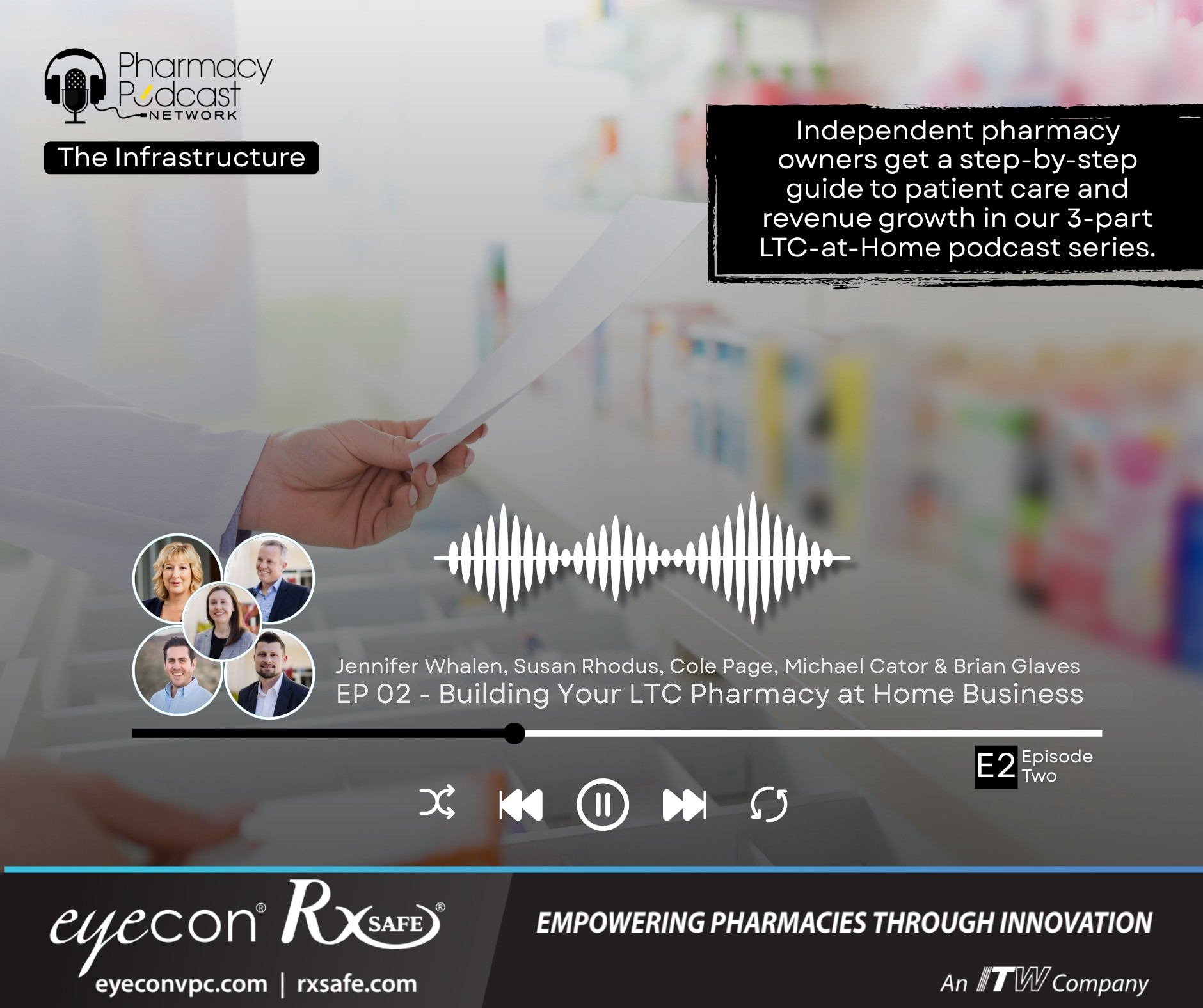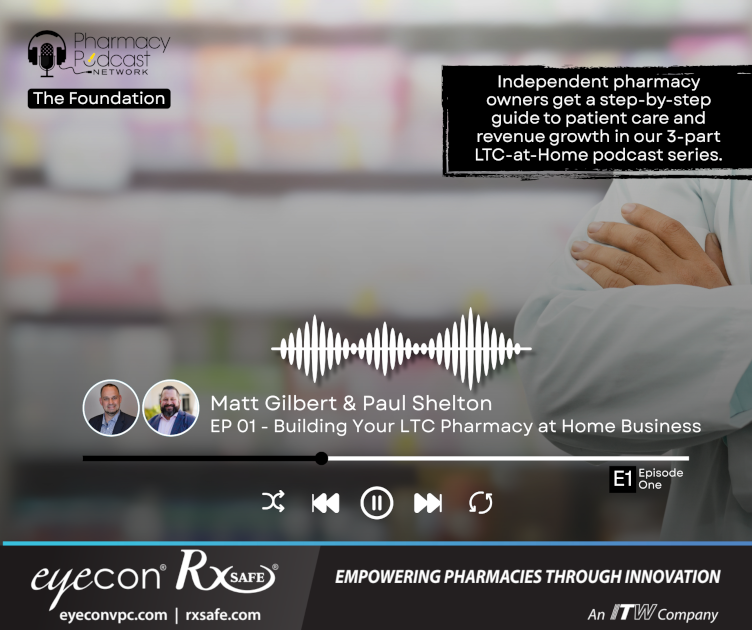As discussed in an earlier blog post, at-home care is an important and rapidly growing segment of the independent pharmacy market.
Medical at Home allows individuals experiencing a range of medical issues and dealing with the challenge of managing multiple medications the option to stay at home to receive the care they need instead of in an institution.
Todd Eury of the Pharmacy Podcast Network hosted the webinar “Expanding Home Care Services through Community Pharmacy” with guests:
- Lisa Faast, pharmacy owner and CEO of DiversifyRx
- Adam Robinson, owner of Save Rite Drugs
- Deborah Marcello, CEO of Happier at Home
The expert panel discussed how home care has evolved and how community pharmacy is fulfilling the growing need to serve patients in their homes.
Below are some highlights of the podcast.
Todd Eury: I want to start with Adam because you have a unique community pharmacy that has invested in a nurse practitioner. How are you leveraging this nurse practitioner to help your patients and customers?
Dr. Adam Robinson: We're a traditional independent pharmacy in a small rural area. There are so many of those out in the country and our providers are completely overwhelmed. When COVID hit and even after COVID subsided, we were still seeing people that couldn't get in. Hey, I've got, you know, COVID, flu, or sprained an ankle. And I have to wait two days. On the flip side, there were some other areas of healthcare that we saw were being met. We had quite a few patients that were coming in that wanted natural care. They wanted holistic, something different. So, my business partners and I had this wonky idea of putting a clinic in the pharmacy, which we've seen in some bigger chains.
They are more like an urgent care clinic, which we don't really have in our area. So, we bounced some ideas around and looked at different things to do. And I had a good friend that was a nurse practitioner here in town, and kind of spit the idea to her and it just took off. We hired a nurse practitioner in a pharmacy, which for as long as I can remember, seems counterintuitive as well. And there are so many benefits that we're seeing now. We've opened a holistic functional medicine, an acute care cash-based clinic inside of our pharmacy. And she's rocking and rolling. And so, we're changing the way healthcare looks. Other providers here in town are still providing excellent service, but now we're meeting the needs of people who either didn't have primary care, or wanted something different that wasn't available. They would have to drive hours away to get it.
Todd Eury: What do you recognize happening in the United States with regard to that balance between the nursing home and the home care and where community pharmacy has an opportunity?
Deborah Marcello: One of the main things that I noticed with our franchisees that are also pharmacy owners is that they had this natural, uh, trust within their community and their customer base that was coming in, that are coming into their retail locations. So, I spoke with many pharmacy owners who said they referred patients of theirs to home care agencies.
Now that's great to form partnerships, but that's also an opportunity for our pharmacy owners to offer services that allow their customers to stay in their home and allow them to expand into home and community-based services. And in this podcast, all our professions brought together. We're showing our pharmacy owners how to become that one-stop shop for their customers. And what Adam was describing is just incredible. I love those ideas, and he's obviously very entrepreneurial. Those are the type of people that really will step outside the box, think outside the box and look for opportunities where they could help their customers and help solve their problems.
What I noticed with my company is that any of our community pharmacy owners that have become happier at home franchisees and started home care services have taken off so quickly, even in comparison to our individuals that became franchisees. But, you have that natural connection with your community. You have the natural connection with discharge planners, your doctor's offices, transitional care units. So then you're also giving your doctor's office that perhaps their patients are coming to you. You're giving them that peace of mind that you can help them with a safe discharge home and help reduce readmissions. One of the main things is to increase their medication compliance as well.
Todd Eury: What about home care and the opportunity that you see in communities throughout the country for community pharmacy jumping into home care?
Dr. Lisa Faast: I think the theme word of what's happening in our industry right now is ‘options.’ Everybody is looking for options. Everybody wants to evaluate options. From the patient perspective, they want the option of staying home. They want the option of paying for the care that they want. Adam mentioned cash-based services for his functional medicine clinic. And as pharmacy owners, we want options for revenue streams and different ways to take care of our patients. That's why I first started compounding in my pharmacy because I wanted the option to be able to take care of patients in a different way.
I think that magic word ‘options’ is really what's happening here. And people like Debbie that are bringing Happier at Home to pharmacy owners and trailblazers like Adam that are showing that you can be successful even in states like Kentucky, where people say the median income isn't high enough. You offer a service that somebody wants, they are going to be willing to pay for it. It's about providing the right options for yourself as a business owner and the right options for your patients. And to me, the magic here is that when you delve into the world of cash-based services, you are no longer are beholden to that third party. And so now you're able to offer services that people want and they'll just willingly pay for them. And we all get to go home and sleep well at night. To me, the magic that's really happening here is we are creating options for our community and options for ourselves.
Todd Eury: We know that adherence packaging has proven itself time and time again as a way to simplify medication management, as well as increasing adherence. How does adherence packaging play into building simplicity for your clients and customers?
Dr. Adam Robinson: I think we do a really good job of taking a problem, shifting it and turning it into a good thing. And one of the problems that we ran into in the independent world for years was adherence. Then we started getting docked on adherence from insurance companies. And so, people started moving to sync programs and med packaging. And what I've seen is that COVID has made people more knowledgeable about their health. They want to know more about their health, and they also want to take control of their health. And adherence packaging has helped us help the patient be adherent. They're not coming into the pharmacy as much, but they really like that.
Then, what we've done with our adherence packaging is with our clinic. Somebody comes in the functional medicine side, there are so many vitamins and supplements that people can take. It can get confusing. And so, we've put in this program to help ease that confusion for patients. We educate them on what they're taking and we make it super simple for them to take it. More people are taking more medicine and it's just confusing. Adherence packaging helps us put the knowledge back in their hands, makes them feel comfortable with what they're taking. And they feel better because they're doing something better for their health. We're seeing the anxiety going away with adherence packaging, which then causes less worries, less stress. We're just seeing smiles walking in the door because of adherence packaging and other services that we can provide.
Deborah Marcello: One of the ways that having home care and compliance packaging can work together is for those that compliance packaging serves a need. But for those that have memory issues or dementia, they may forget to take that. Having a caregiver to remind them to take their medication is how you help with the entire continuum and how we all work together, and our services fit so well together. My phrase for the month is ‘one-stop shop.’ You all, as pharmacy owners, can provide so many services to be that one-stop shop for everyone, give them their options to be able to remain in their home and independent.
Dr. Adam Robinson: A lot of our patients that are on strip packaging are being taken care of and we're communicating directly with the caregivers, and we are relieving so much stress. Because that is a very stressful thing - to take care of someone. And we are helping with that from adherence packaging and other programs. So, everybody's getting together and we're actually starting to do what we've been wanting to do for so long and help each other at every level.
Todd Eury: What do you think of this in general for community pharmacy to get deeper into home care as a business opportunity?
Dr. Lisa Faast: I think for most retail independent pharmacy owners, this is going to be a really good fit and it is important to point out there is not one magic bullet that will fit every single pharmacy, no matter how good the opportunity. But for home care, the typical retail pharmacy has a mix of elderly patients and people that are in their thirties and forties taking care of their kids and taking care of their parents. And there is that need because you are that community pharmacy, your pharmacy is a reflection of your community. Most pharmacy owners are going to have this subset of patients that need help. And there is a need out there. They're looking for something different. I am in a lot of FIRE (Financial Independence Retire Early) groups, and one of the biggest burdens that most people worry about when it comes to retiring is taking care of either an elderly parent or taking care of themselves in some sort of facility because of the costs.
To qualify for Medicaid, there is a five year look back and all these different things and it's very complicated. Whereas many do not know that there is this middle ground, and they often ask in these homes, “Why can't I just get help in my home?” I sometimes answer, “Well, you can, there are options out there.” And so, a lot of people think it's just two ends of the spectrum. I'm either completely independent or I need full-time care. And there really is a whole middle area that pharmacy owners can help facilitate. We all know that the whole wellbeing of a patient is much more than just their medications. Yes, that is a critical part, but it is also their social, mental g and emotional wellbeing.
I think it has been proven time and time again, when patients are in their own homes and they are able to take part in their regular social activities and schedules, that they're going to be happier. That is why I love the name ‘Happier at Home.’ They're going to be happier and more well-rounded human beings, and, their healthcare is going to follow along even better. So, it's really about taking care of that entire patient and giving them the option that fits their budget and their lifestyle, which I think is really important. I think it's pretty cool that pharmacy owners can now extend that care into that population. Because as you said, the baby boomers are not slowing down aging. Aging is one of the things that's guaranteed to happen and there's many more behind them. I think this is a big opportunity for years and decades to come for pharmacy owners.
To listen to the whole podcast, click here.
To learn more about how you can expand your pharmacy’s own home care services, click here to contact us or speak with our pharmacy transformation experts at (833) 791-1772.








.png)
